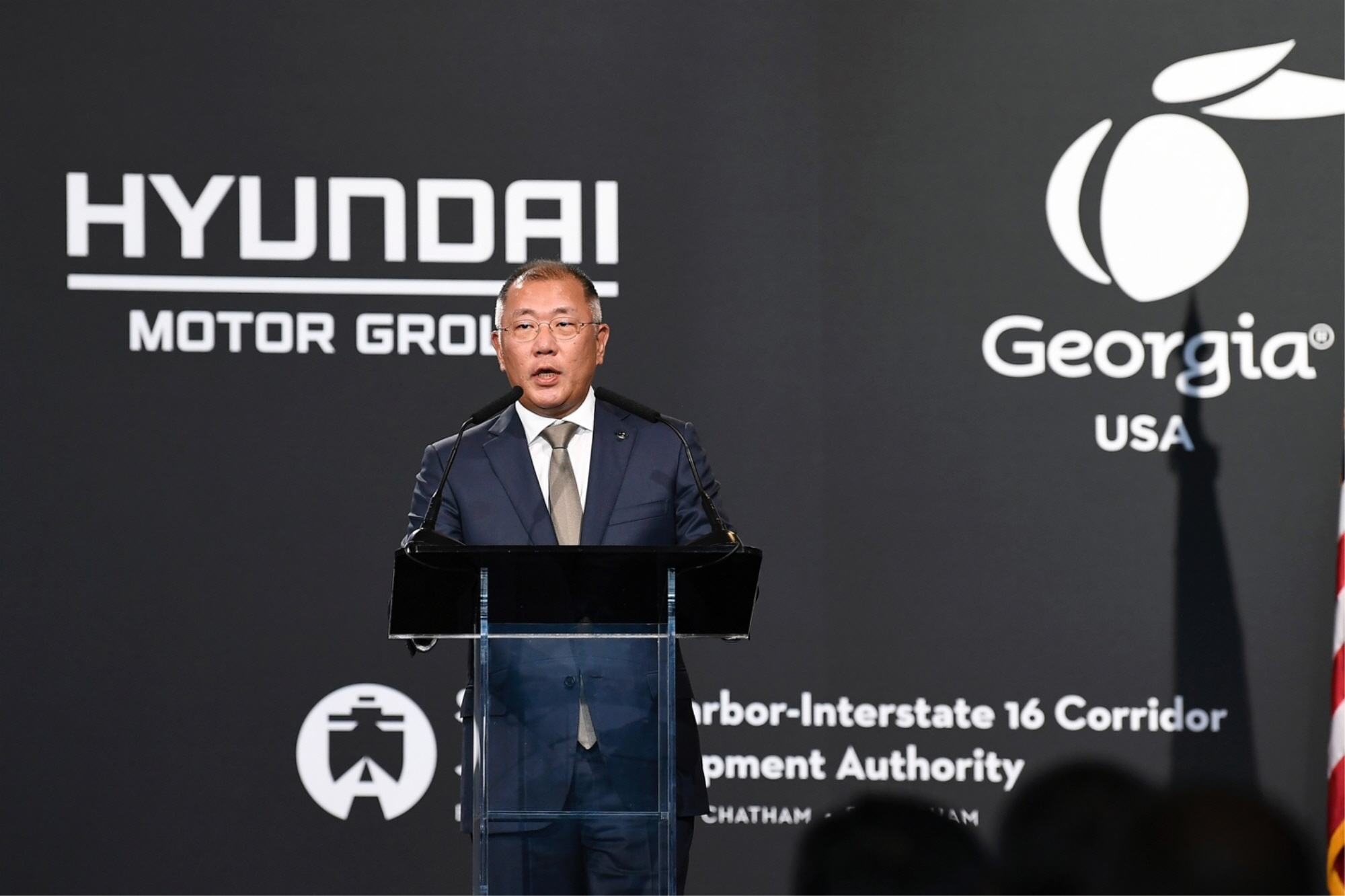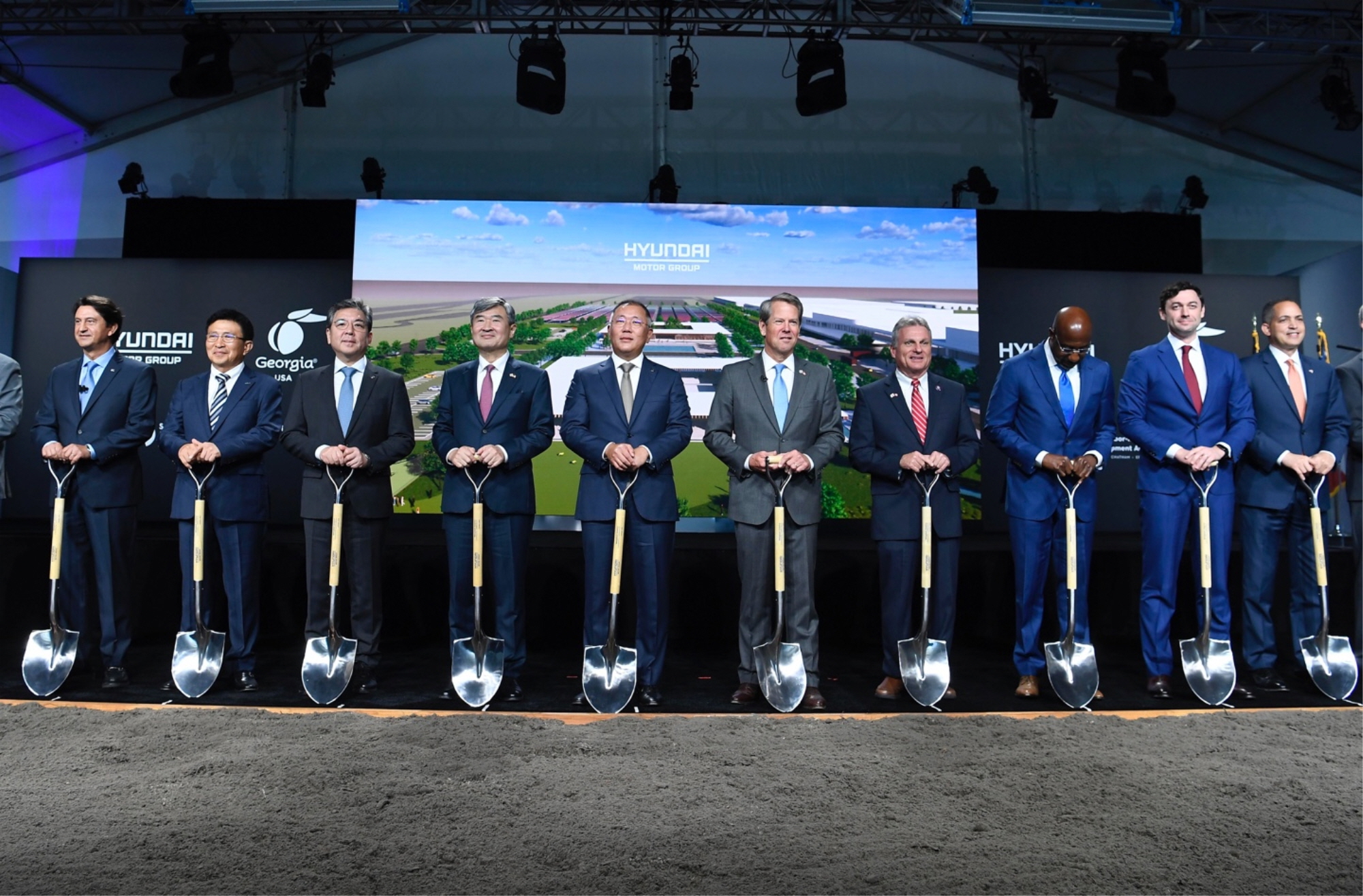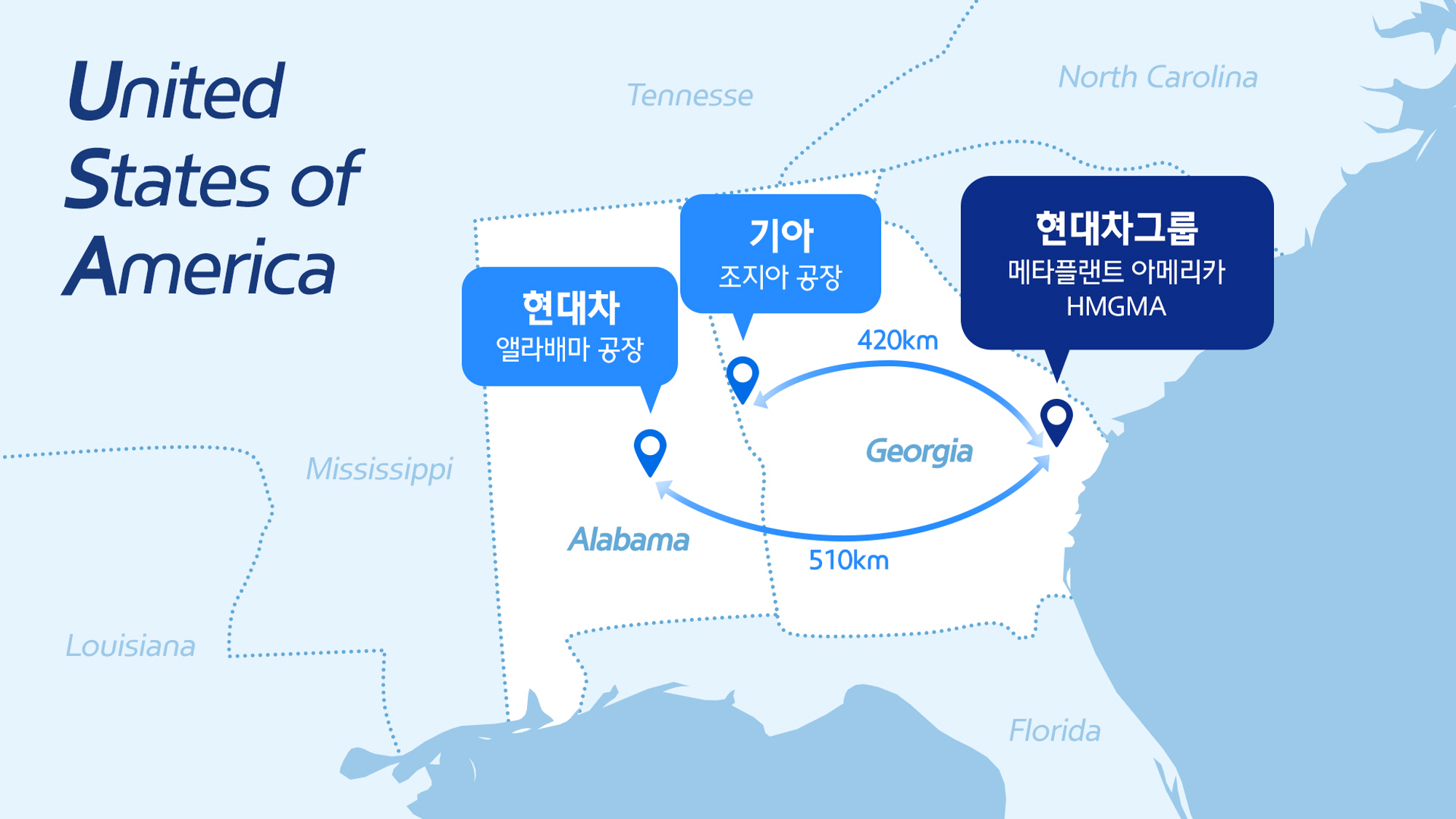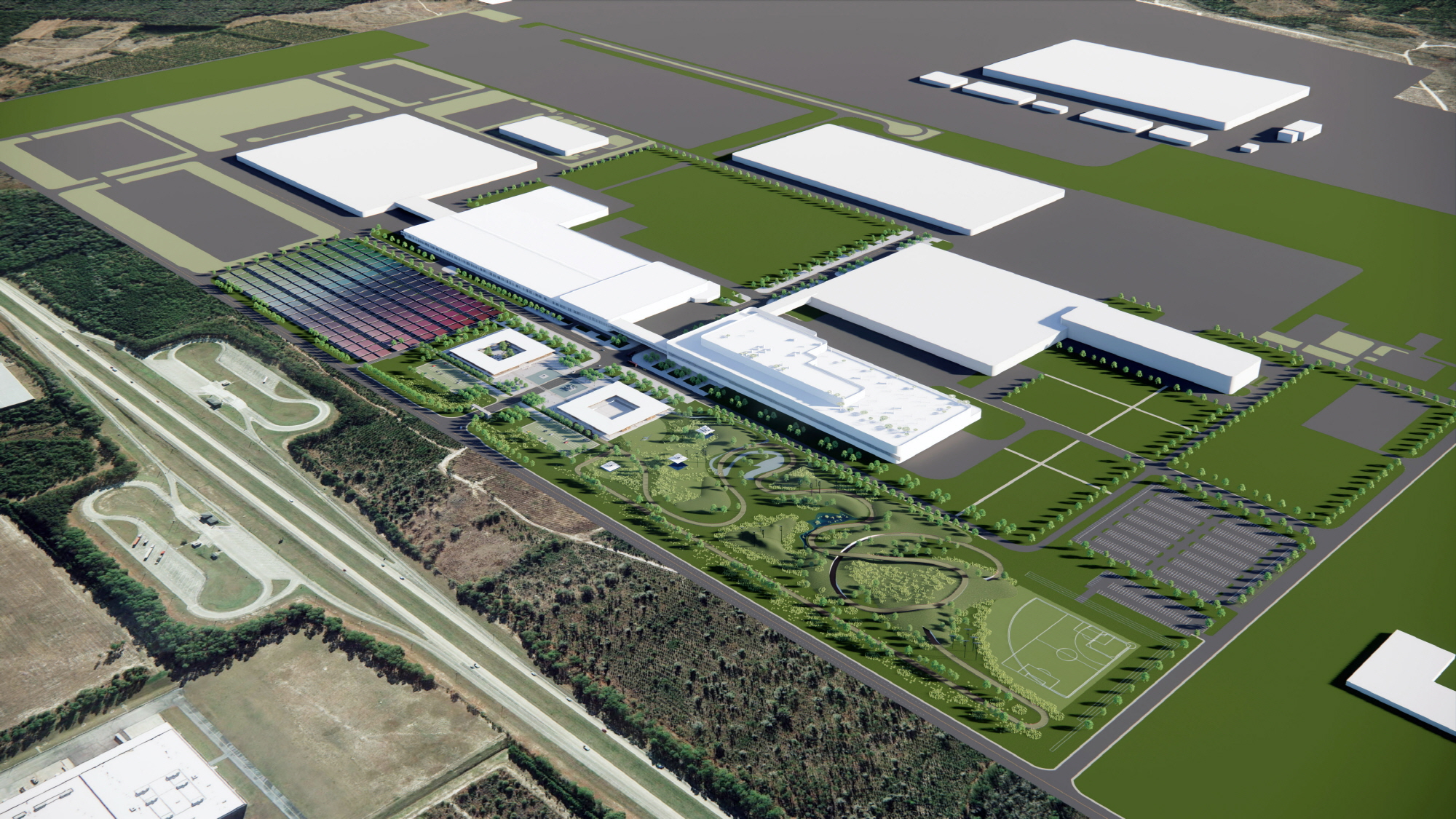
Hyundai Motor Group has officially announced the establishment of its dedicated electric vehicle plant in the U.S. as part of its strategy to solidify its position as a global ‘top-tier’ EV manufacturer. This is a strategic decision aimed at reinforcing its status as a ‘first mover’ in the rapidly evolving electrification trend.
On the 25th (local time), Hyundai Motor Group held a groundbreaking ceremony for the new electric vehicle factory, “Hyundai Motor Group Metaplant America”, located in Bryan County, Georgia.
The ceremony took place at the site of HMGMA. After key attendees broke ground for the construction, a second part of the event was held at the Enmarket Arena in Savannah, about a 30-minute drive from HMGMA. This secondary event, aimed at strengthening ties with the community, welcomed local residents to celebrate the groundbreaking. During this occasion, Hyundai Motor Group introduced its latest mobility technologies, including electric vehicles and robotics, as well as its social contribution activities through Hyundai, Kia, and Genesis in the region.
Key figures from both the U.S. and South Korea attended the HMGMA commemorative event, including Georgia Governor Brian Kemp, Senators Raphael Warnock and Jon Ossoff, Congressman Buddy Carter, Deputy Secretary of Commerce Don Graves, and South Korean Ambassador to the U.S. Cho Tae-yong. Hyundai Motor Group was represented by Chairman Chung Euisun, along with CEO Jang Jae-hoon and COO Jose Munoz.
In his speech, Governor Kemp remarked, “The partnership with Hyundai Motor Group and the groundbreaking of this innovative factory mark an unprecedented economic achievement for the state of Georgia. We hope this partnership lasts for a long time and that the investment by Hyundai Motor Group will benefit both sides.”
Chairman Chung emphasized, “We have finally found the optimal location and partner to execute Hyundai Motor Group’s vision of ‘Progress for Humanity.’ We will make the new plant ‘Metaplant America’ a world-class electric vehicle production facility that everyone envies.”

HMGMA will be built on an area of 11.83 million square meters (approximately 3.58 million pyeong) with an annual production capacity of 300,000 electric vehicles. Construction will commence in earnest in the first half of next year, with mass production starting in the first half of 2025.
The HMGMA, as Hyundai Motor Group’s first plant, will produce electric vehicles for Hyundai, Kia, and Genesis brands. It will feature a flexible production system capable of responding swiftly to local customer demand for various electric vehicle models.
The three production bases of Hyundai Motor Group in the U.S. are located close to each other, allowing for expected economies of scale in terms of parts procurement and supply chain management. HMGMA is about 420 km from Kia’s U.S. manufacturing plant in Georgia and about 510 km from Hyundai’s U.S. manufacturing facility in Alabama, each approximately a 4-hour and 5-hour drive away, respectively.
Hyundai Motor Group plans to operate HMGMA as a top-tier smart factory of the future. To this end, it plans to introduce a manufacturing innovation platform developed at its ‘Singapore Global Innovation Center’.
The manufacturing innovation platform at HMGICS incorporates AI-based intelligent control systems centered on demand, eco-friendly low-carbon methods for achieving carbon neutrality and RE100 (100% renewable energy use), and human-friendly equipment that enables safe and efficient operations.
For instance, collaborative efforts between humans and robots can reduce workers’ physical strain, and any issues during processes can be remotely solved without physical visitation. This innovative manufacturing technology, combined with intelligent and robotic systems, will create a ‘human-centered future factory’ representing the brand.
In this way, Hyundai Motor Group has placed the term ‘metaplant’ in the official name of the factory, aiming to realize the possibilities of metamobility in everyday customer life as a ‘sustainable future mobility factory’.

The state government of Georgia is also planning to provide various incentives step-by-step in line with the construction of HMGMA. The incentives from Georgia include income deductions related to job creation and property tax exemptions. Local governments under the state government will also support part of the costs for building power plants and roads.
Set to commence mass production in the first half of 2025, HMGMA is expected to serve as a crucial base for Hyundai Motor Group’s penetration into the U.S. electric vehicle market.
Hyundai Motor Group aims to sell a total of 3.23 million electric vehicles globally by 2030, achieving around 12% market share. In the U.S., a key advanced market, the target is to sell 840,000 electric vehicles by 2030.
From the beginning of this year to the third quarter (January to September), Hyundai and Kia sold 47,095 electric vehicles in the U.S., marking a significant 212.0% increase compared to the same period last year. Leading the charge, Hyundai sold 22,418 units, an increase of 142.3% compared to the previous year, with the Ioniq 5 accounting for 18,492 sales. Kia also saw a sharp rise in sales, moving 24,677 electric vehicles, including 17,564 units of the EV6, representing a 322.2% increase for the same period.
The proportion of electric vehicles within Hyundai Motor Group’s total sales in the U.S. (4.3% in the first three quarters of this year) has also significantly increased compared to last year’s 1.3% for the same period. Hyundai Motor Group expects electric vehicle sales in the U.S. to grow exponentially once HMGMA begins its full operation.
Hyundai Motor Group plans to build a stable local procurement system not only for completed vehicles but also for batteries required for electric vehicle manufacturing and sales. They will establish partnerships with global battery manufacturers and set up a battery cell plant near HMGMA.
In the joint battery plant, they will co-develop battery products optimized for Hyundai, Kia, and Genesis electric vehicles for mass production, ensuring that high-efficiency, high-performance, and safe electric vehicles are produced on time for local sales at HMGMA.
Furthermore, Hyundai Motor Group is looking to construct dedicated electric vehicle production facilities both domestically and internationally, ramping up the electrification transition. Hyundai plans to build a new electric vehicle factory at its Ulsan plant’s proving grounds, while Kia will construct a dedicated PBV electric vehicle plant at its Hwaseong AutoLand. Both facilities will commence mass production in 2025, the same time as HMGMA.
Utilizing these three electric vehicle dedicated bases at home and abroad, Hyundai Motor Group is expected to enhance its standing in the global automotive market, leading to increased exports of both domestic completed vehicles and electric vehicles. In fact, Hyundai and Kia’s domestic production last year was 12% higher compared to the period just before the operation of Hyundai’s Alabama plant in 2004, and the completed vehicle export amount also increased by 79% during the same period.
By 2030, Hyundai (including Genesis) plans to establish an electric vehicle lineup of 18 models, while Kia aims for 13 models, with an annual production target of 1.44 million electric vehicles domestically.

Lee Sang-jin daedusj@autodiary.kr

